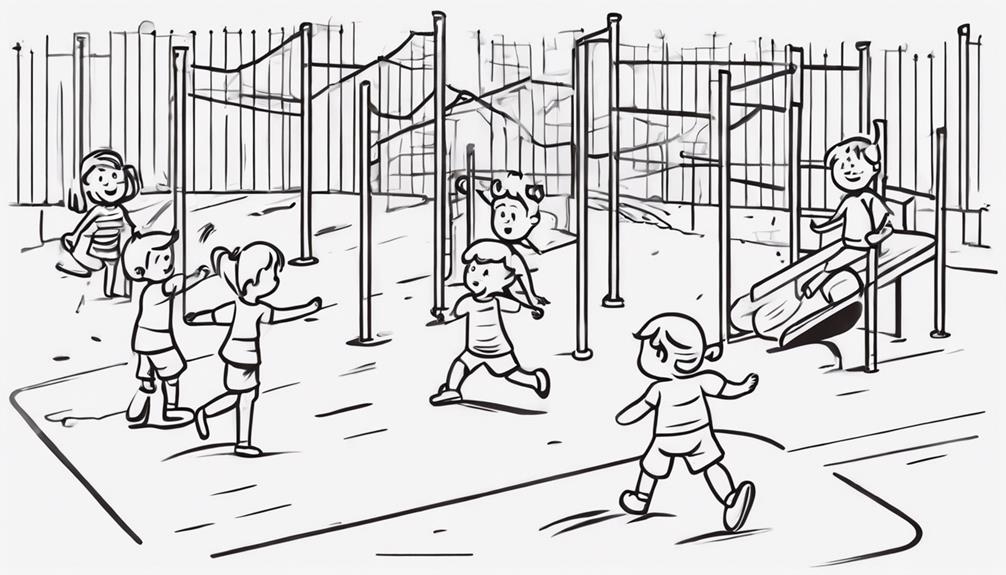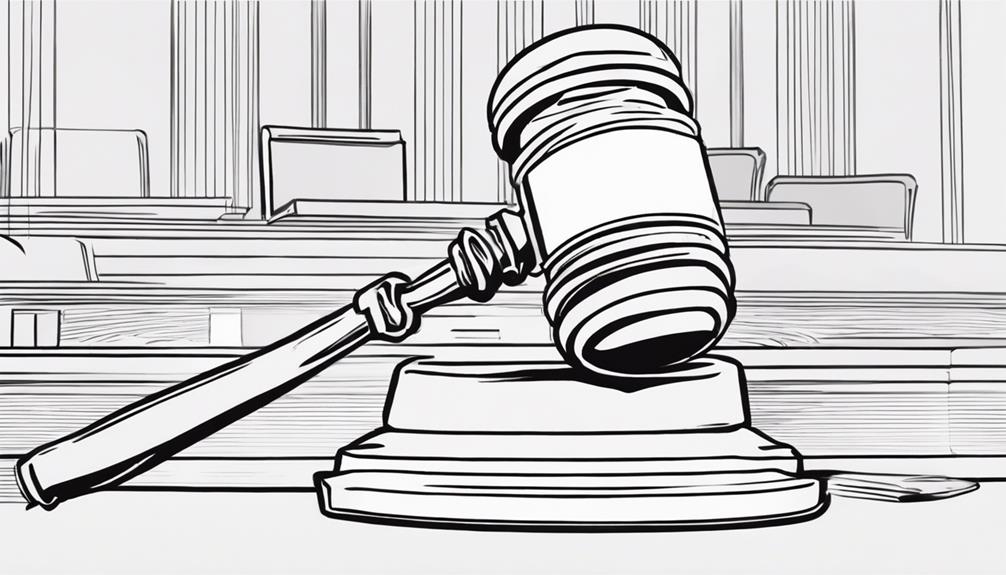Rules and laws form the backbone of societal structure, serving as the fundamental framework that guides human behavior and interactions. They are not arbitrary constraints but rather essential mechanisms that uphold order, safeguard rights, and promote equity. By exploring the underlying principles and rationale behind the establishment of rules and laws, we can gain a deeper understanding of their vital role in shaping our communities and fostering a sense of collective responsibility.
Key Takeaways
- Rules and laws maintain order, promote safety, and ensure fairness in society.
- Boundaries set by rules reduce harm and conflicts, fostering accountability and discipline.
- Legal framework protects rights, resolves disputes, and promotes justice and accountability.
- Upholding rules and laws creates a structured and secure environment for individuals and communities.
Importance of Establishing Rules

Establishing rules is imperative for maintaining societal order, promoting safety, and fostering fairness among individuals. Rules serve as the foundation for a functioning society, providing a framework that outlines acceptable behaviors and limits. By setting boundaries, rules contribute to public safety by reducing the likelihood of harm or conflict. They offer structure and guidance, ensuring that individuals understand their rights and obligations within the community.
Moreover, rules promote accountability among citizens, as adherence to these guidelines instills a sense of responsibility and discipline. Upholding rules not only protects citizens' rights but also establishes community standards that contribute to a harmonious coexistence. By defining expectations and consequences, rules create a level playing field where all individuals are treated fairly and justly.
In essence, rules and laws are essential components of societal governance, playing a crucial role in maintaining order, promoting safety, and fostering a sense of accountability among individuals.
Role of Laws in Society
Playing a pivotal role in societal organization and governance, laws serve as fundamental instruments that regulate conduct, uphold order, and safeguard individual rights and freedoms.
- Regulating Behavior: Laws establish guidelines for acceptable behavior within a society, defining what is permissible and what is not. By setting boundaries, laws help maintain order and harmony among individuals.
- Ensuring Justice: Laws provide a framework for resolving disputes and ensuring justice. They promote accountability by holding individuals responsible for their actions and decisions, contributing to a fair and equitable society.
- Protecting Rights and Safety: Laws play a crucial role in safeguarding individual rights and freedoms, ensuring that every member of the community is treated fairly and with respect. They also help promote safety by establishing standards that prevent harm and protect the well-being of all members of society.
In essence, laws are essential for creating a structured and secure environment where individuals can coexist peacefully, knowing that their rights are protected, and justice is upheld.
Ensuring Safety and Fairness

Laws and regulations are paramount in ensuring the safety and fairness of individuals and communities, serving as foundational pillars that uphold societal order and protect individual rights. Rules play a critical role in keeping everyone safe by establishing boundaries that prevent harm and maintain public safety. By following the rules, individuals contribute to the overall well-being of the community, fostering a sense of security and harmony.
Moreover, laws are designed to protect and uphold fairness by ensuring that everyone is treated justly and equitably. They provide a framework for resolving disputes, addressing grievances, and promoting equality within society. Upholding regulations not only safeguards individual rights but also helps in maintaining order and stability, preventing conflicts and injustices.
In essence, the adherence to laws and rules is essential for creating a cohesive and balanced society where public safety is prioritized, fairness is upheld, and the rights of individuals are protected. Thus, the enforcement of regulations is vital for fostering a community where everyone can thrive and coexist harmoniously.
Significance of Legal Framework
The legal framework serves as the cornerstone of societal organization, providing a structured system of guidelines and regulations that govern acceptable behavior within a community. To understand the significance of the legal framework, consider the following points:
- Rule of Law: The legal framework ensures that laws apply equally to all citizens, creating a sense of fairness and justice within society.
- Safety and Accountability: By enforcing important rules and regulations, the legal system promotes a safe environment for everyone and holds individuals accountable for their actions, contributing to a harmonious community.
- Protection of Rights: Through the legal framework, citizens' rights are safeguarded, and legal regulations cover various aspects such as contracts, property rights, and public safety, ensuring that everyone is treated justly and equitably.
In the United States, the Constitution underpins the legal system, guiding courts in interpreting and applying laws to uphold justice and reinforce the rule of law in American democracy. The legal framework is essential for maintaining order, protecting citizens, and fostering a cohesive society based on accountability and fairness.
Upholding Order and Justice

Amidst the complexities of societal interactions, the maintenance of order and justice stands as a fundamental pillar essential for the functioning of a cohesive community. At schools, rules play a crucial role in upholding order by providing clear guidelines for student behavior and promoting a safe learning environment. These rules not only ensure fairness and accountability but also teach students the importance of respecting boundaries and authority. Upholding rules at school is not just about discipline; it is about instilling values that contribute to the overall well-being of students and the school community.
Enforcing rules and laws in society is necessary to maintain social order, prevent chaos, and protect the rights and safety of all individuals. Without such regulations, there would be inconsistencies, conflicts, and potential exploitation of vulnerable populations. By upholding rules and laws, authorities promote justice by ensuring that everyone is treated equitably under the law. This enforcement is essential for creating a harmonious and just society where individuals are held accountable for their actions and where the rights of all members are safeguarded.
Frequently Asked Questions
What Are 3 Reasons Why We Have Laws?
Laws are essential for maintaining social order, ensuring public safety, and promoting accountability. They protect individual rights, prevent chaos, and uphold moral conduct within civil society. By establishing guidelines for behavior and consequences for violations, laws contribute to a fair and just society. The justice system enforces these laws, ensuring equality before the law for all citizens. These reasons collectively underscore the importance of having laws in place.
What Is the Purpose of the Rules and Laws?
The purpose of rules and laws is multifaceted, serving to maintain social order, ensure public safety, and prevent chaos. By establishing boundaries and standards for acceptable conduct, rules and laws promote fairness, accountability, and compliance within society. They protect individual rights, maintain order, and encourage a harmonious coexistence of individuals. Through their enforcement, rules and laws contribute to the overall well-being and stability of a community.
Why Is Rules of Law Important?
Rules of law are important for maintaining social order, justice, and public safety. They provide a framework for regulation, enforcement, and compliance, ensuring accountability and equality. Laws protect individual rights, deter criminal behavior, and help in conflict resolution. By setting norms, governing behavior, and promoting stability and harmony, rules of law are essential for creating a functioning society where everyone is held to the same standards under a fair legal system.
Why Do We Have Rules in School?
Rules in school are essential for maintaining order and promoting a conducive learning environment. They regulate classroom behavior, ensuring student safety, academic integrity, and adherence to a uniform policy. By setting attendance requirements, promoting respectful behavior, and implementing anti-bullying measures, rules instill a sense of responsibility in students. Disciplinary procedures help address misconduct promptly, fostering a culture of respect and accountability that enhances the overall educational experience.
Conclusion
In conclusion, rules and laws are crucial for maintaining order, promoting safety, and ensuring fairness in society. They serve as guidelines for acceptable behavior, protect individual rights, and prevent chaos and conflict. By upholding these legal frameworks, individuals contribute to the well-being and stability of their communities. Interestingly, studies have shown that societies with strong rule of law have higher levels of economic development and overall well-being.
